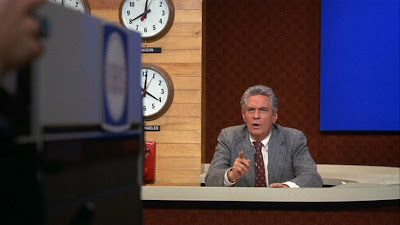A few days ago, when asked by a new acquaintance what I did for a living, I replied that I was “a writer”, because I couldn’t bring myself to admit to a stranger that I’m a journalist.
Read on here.
Update.
A conversation about journalism, the internet, media, trust, truth, libraries & archives, social networks
& publishing, and the democratisation of doubt - with occasional photographs and a nod to cinema.
A few days ago, when asked by a new acquaintance what I did for a living, I replied that I was “a writer”, because I couldn’t bring myself to admit to a stranger that I’m a journalist.
Amazon must be tickled pink that the iconic talk show host has given its Kindle a ringing endorsement, which came as part of her show on Friday.
Winfrey says the device “was life-changing” and is “the wave of the future.” With her influential book club, which have turned many an author into overnight success stories, Oprah brings a large consumer base into Amazon’s waiting open arms.
In one particularly revealing moment, Ariana talked about how journalism should not be an exercise in covering all sides of a story, but an investigative search for the truth - which is usually on one side or another.
Now, what do videogames and Obama have to do with newsrooms? It's clear that over the past year, Obama's campaign has developed a profound understanding of how its community finds and consumes information across a number of platforms. And Obama has embraced them all, and adapted his message to fit the way people use those platforms.
That's an important lesson that every newsroom should learn. During the past year of research for The Next Newsroom Project, we identified six principles that newsrooms should adopt. One of those calls for newsrooms to embrace all platforms. It's not enough to simply say, "Hey, we want to be online first." Instead, think about how to use all platforms equally: mobile, the Web, print, broadcast (radio and TV). And be ready to experiment with any new ones that come along, including video games.
“We are trying to speed up the metabolism, to create within the journalistic community a real sense of competition. We need to be ahead of the other media all of the time...We must offer mobile delivery of content because the speed of delivery changes the nature of the content itself.”
If American politics is at low ebb, it is because so many of its observers enjoy working in its fetid backwash.

That's the only reason the poor slobs pay you - to see their names in my column all over the world. Now, I make it out, you're doing 'me' a favor?... The day I can't get along without a press agents' handouts, I'll close up shop and move to Alaska, lock, stock, and barrel.
When Obama went on vacation to Hawaii to visit his grandmother, ABC pundit Cokie Roberts declared (8/10/08): "Going off this week to vacation in Hawaii does not make any sense whatsoever.... I know Hawaii is a state, but it has the look of him going off to some sort of foreign, exotic place. He should be in Myrtle Beach, you know."
“I don’t think Joe the Plumber wears Manolo Blahniks,” Ms. Behar said.
"We are not looking for people who are inwardly focused," says Sherrod. Rather, he wants people who are experts in their field, whether that is real estate, restaurants, parenting, sports, technology, or business.
These writers are vetted and paid based on how many pageviews and advertising clicks their articles can produce. The pay is not a lot. It starts at a $2.50 for every thousand pageviews. The median amount each examiner is making right now is $25 a month, although Sherrod has written a check for as high as $1,700.
One Osborne tactic which has irritated colleagues is his tendency to send out text messages to junior frontbenchers, often late in the evening, with mildly critical remarks. When the hapless MPs reply they receive no response because Osborne has switched off his phone. The following day he will joke that he meant no harm and that he was sending group texts.

I left off before with a cliffhanger: Me and my agent entering the Shoreham Hotel, penthouse level, door #6. What lay behind that door? Something cool, no doubt. Doubt not: It was cool. A slick moderned-up suite with windows everywhere, a flatscreen television showing off cover images of The Tourist, waiters with curious snacks, and a bartender serving up “The Tourist”–a cocktail they rustled up for the event, which includes:
Skyy Cherry vodka
White cranberry juice
Red cranberry juice
–and two sliced strawberries for garnish
Okay, looking at it now it looks a pretty sissy drink. Sam Tanenhaus said it tasted like a Shirley Temple. But the magic is all in the proportions, which is a state secret.
If you quit now, you're in good company. Notorious chatterbox Jason Calacanis made millions from his Weblogs network. But he flat-out retired his own blog in July. "Blogging is simply too big, too impersonal, and lacks the intimacy that drew me to it," he wrote in his final post.
Impersonal is correct: Scroll down Technorati's list of the top 100 blogs and you'll find personal sites have been shoved aside by professional ones. Most are essentially online magazines: The Huffington Post. Engadget. TreeHugger. A stand-alone commentator can't keep up with a team of pro writers cranking out up to 30 posts a day.
"Federal dollars were not intended to be used for lobbying, and it would be unconscionable for these companies to misuse taxpayer dollars in this way," Feinstein said in a statement.
The Web is pervasive and can spread the word faster and more widely than information has ever moved before, and that might have made a difference in the way the Knight Ridder stories were received if they were supported by aggregators with proven integrity and stature. That is one of the goals of ProPublica, the new investigative on-line news organization underwritten by the philanthropists Herb and Marion Sandler.
Google is applying the same approach to social networks it has used to dominate the online search business. If this works, it may finally make ads on social networks relevant—and profitable.
Google declined to discuss its idea with BusinessWeek. But it is based on the same principle as PageRank, Google's algorithm for determining which Web sites appear in a list of search results. The new technology could track not just how many friends you have on Facebook but how many friends your friends have. Well-connected chums make you particularly influential. The tracking system also would follow how frequently people post things on each other's sites. It could even rate how successful somebody is in getting friends to read a news story or watch a video clip, according to people familiar with the patent filing.
[Stephen] Greenblatt continued to say that last year Harvard passed a vote that faculty would be required if they wrote an article to allow access to a digital version for Harvard, so that all their scholarly work would be universally accessible digitally. "As a general principle, the idea that the work that we do should have value digitally and have universal access," is what Greenblatt says he had been calling for for years. In an article for the MLA, he said we must transform our understanding of what it means to appear on the web and how we can use that. We must make more broadly accessible our work. We must feel that work is significant; though the web must take into consideration the feeling of community that is subscription-based. You feel you are part of a community when you subscribe to a scholarly journal. But ultimately your work can reach a larger scholarly audience with the internet.
Increasingly, privacy not pipes are the front line in the battle for broadband Britain. Put simply, we expect most of our online entertainment and information free. The music industry has discovered this to its cost, as illegal downloads proliferate. If content is to be delivered free, but with revenue to intellectual property owners, it must be supported by advertisements. Advertisers will do this only in exchange for knowledge of who is receiving their promotional message and when.

And whereas socialism was borne of the belief that the "bourgeoisie" exploited the working class, digital socialism is largely borne of the belief that the owners of intellectual property use their rights to exploit the consuming class.
As we are living in a world where Goldman Sachs has been part-nationalised by George Bush and Iceland went bankrupt in a weekend, I can't think why anyone would be particularly shocked by the idea that in a declining market of 19 national news titles, it would be unthinkable that a significant number might disappear, given the apparent scale of economic failure. It's not to be welcomed, or encouraged, but you cannot pretend that somehow it won't happen.
Three years ago, if you had purchased $10,000 worth of beer and then got drunk each day ever since, the value of the deposits on the beer kegs would have given you a better Return on Investment than if you had investment that $10,000 in almost any U.S. newspaper company. Moreover, you'd have plenty of beer left and would have had a much better time!
Members of the public, LSE staff and alumni can request one ticket via the online ticket request form which will be live on this weblisting from 10.00am on Friday 7 November.
If news orgs like the NYT, Washington Post, and hundreds of newspaper sites start linking to news and other content around the web in a big way, on their front pages (as the NYT plans) and across their sites, it will have a HUGE impact on the web’s link economy.
Muslim social network Muxlim.com, live since late 2006, is planning to launch a Muslim-oriented virtual world not unlike Second Life. The idea is that something tailored to the Muslim world would be allowed through the IP-blocks of countries like United Arab Emirates which currently stops access to virtual worlds and online games considered unsuitable or offensive to Muslim culture.
Finally, there are the great realist novelists, who often see more clearly than journalists. So far, my Google search has not picked up any excerpts from Zola’s novel Money being read on the nightly news. In this brilliant chronicle of a speculative stock bubble, launched by a character named Saccard in 1860s Paris, Zola cuts right to the heart of America’s boom-and-bust neurosis: “Wasn’t such great and rapid prosperity the result of the methods for which [Saccard] was now being blamed. All of this came together. If one accepted the success, one had to accept the risks. When you overheat a machine, it sometimes explodes.”

I don't have to tell you things are bad. Everybody knows things are bad. It's a depression. Everybody's out of work or scared of losing their job. The dollar buys a nickel's work, banks are going bust, shopkeepers keep a gun under the counter. Punks are running wild in the street and there's nobody anywhere who seems to know what to do, and there's no end to it. We know the air is unfit to breathe and our food is unfit to eat, and we sit watching our TV's while some local newscaster tells us that today we had fifteen homicides and sixty-three violent crimes, as if that's the way it's supposed to be. We know things are bad - worse than bad. They're crazy. It's like everything everywhere is going crazy, so we don't go out anymore. We sit in the house, and slowly the world we are living in is getting smaller, and all we say is, 'Please, at least leave us alone in our living rooms. Let me have my toaster and my TV and my steel-belted radials and I won't say anything. Just leave us alone.' Well, I'm not gonna leave you alone. I want you to get mad! I don't want you to protest. I don't want you to riot - I don't want you to write to your congressman because I wouldn't know what to tell you to write. I don't know what to do about the depression and the inflation and the Russians and the crime in the street. All I know is that first you've got to get mad.
So, after a little prodding on William’s part, I began my reading. Here’s what I read on the day that I showed up with hardly any voice to lecture:
Dr. Stern really can't talk. She sounds like Haley Joel Osment saying, "I see dead people," in The Sixth Sense.
It was probably apt. He wished me well in the blog and I responded with thanks for the good wishes.
I eventually read all of the entries and responded to a few posts, too. Generally, William both encapsulated the classes and lent his own (often strong) opinion in a voice that was uniquely his own.
I often felt like I was under a microscope, my every movement exposed:
Dr. Stern walks in at 11:10 am. She has a habit of doing that.
Most damaging, the mainstream press lost touch with its audience at the very moment when technology, via the internet, was dramatically lowering the barriers to entry. Whether this was an unhappy coincidence or complacency is unclear. What is undeniable is that public trust in newspapers started to slip, to the point where a recent study by Sacred Heart University shows barely one in five say they can believe “all or most” media reporting (well below comparable British figures).
Entering the Post newsroom was like walking on to the set of All the President’s Men , the 1976 film starring Robert Redford and Dustin Hoffman as the Post’s own Bob Woodward and Carl Bernstein, with its row upon row of reporters, each with their desk-top computers. (At the FT, we still bashed away on typewriters.) Bradlee’s glass office stood in the centre of the newsroom. Woodward’s investigative team was tucked away at the back. There was a swagger about the place that was irresistible.

'I never love editors,' he says. 'But David is smart and he has great judgement.' How often does he check in with Remnick? 'I'm sure he would tell you less often than I should. He gets pretty angry with me. Sometimes we have these rows where I won't take his calls. He says no to a lot of stuff - stuff I think the editor would die for! Admittedly, it is not the Seymour Hersh weekly. But sometimes he'll say: "We are not going to publish this kind of stuff 'cos it's frigging crazy."' It was Tina Brown, formerly of Tatler and Vanity Fair, who brought him to the New Yorker. 'What's-her-name... yeah, Tina. She gave me a lot of money, and she said: "Just go do it!" But she used to worry. She'd call me up and say, "I sat next to Colin Powell at dinner last night and he was railing about how awful you are." So I would say, "Well, that's good." And she'd say, "Is it?" And I'd tell her, "Yes, it is."'
And Google won't let users switch their home pages back to the way they used to be, which has sparked a furious revolt, online activism, and even some homegrown fixes.
"We're constantly thinking about how to improve our products for our users," said Jessica Ewing, iGoogle's senior product manager, in an e-mail. "Then we take our ideas, prototype them, and put them through a vigorous set of usability tests and experiments to make sure we are doing the right thing for users. The iGoogle features we launched yesterday [Oct. 16] went through this exact process, and we've made changes along the way based on feedback from users and developers."
While the library community appreciates institutional networks, academics feel closer to their own disciplinary networks. In my interviews, faculty members told me that at the heart of their reaction are concerns about quality (which is an essential criterion for scholarly outputs) and potential copyright infringements. Several faculty members I talked with during my study expressed the need to stay closer to their special communities through networking and information sharing both for professional development and for building reputation. Also, many of them expressed their preference for posting articles on their own Web sites rather than institutional repositories.
"Google insists that its revised iGoogle personalized home page generates better 'happiness metrics' than the old design, but a vocal group of users isn't happy about the changes." The recent change introduces what Google refers to as "canvas view," which the Official Google Blog claims "... makes iGoogle a more useful homepage and a better platform for developers."